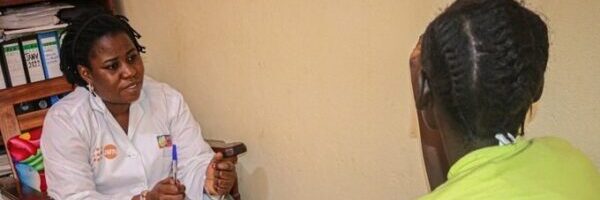In DRC, pooled funding strengthens the health response to gender-based violence
DRC | 2022 and 2023 | CERF and CBPF
DRC, North Kivu and Ituri provinces. The successive humanitarian crises have affected the lives of civilians in eastern DRC and driven mass displacement and violence. Many thousands of women and girls have suffered from gender-based violence.
Armed men attacked Samantha when she was on her way to a neighbouring village to do marketing.
Local NGO ‘Hope in Action’ is implementing a GBV response programme alongside UNFPA, with funding from the DRC Humanitarian Fund. Because of this programme, Samantha was able access health and psychological support to help her deal with the aftermath of the attack. She later married her fiancée and started a family with him.
The programme also supports maternal health care provision, which Samantha used when she and her husband grew their family and she became pregnant with twins.
It’s important to note that the programme supports the partners of violence survivors. Samantha’s husband, Sam, has stayed by her side. “I quickly understood that it was not her fault, and I continue to support her by going with her to the health center and help her overcome the ordeal.”
“I was at the health center when my wife gave birth. I must admit I never imagined having two babies at the same time. The midwife sprinkled flour on my head and called me ‘Father’. I was amazed and very happy. Since then, I have truly felt like a ‘Father’,” said Samantha’s husband.
Making sure the response is holistic
CERF funding supported a similar programme with UNFPA across several regions of eastern DRC. Working with local partners including SOFEPADI, UNFPA aimed to holistically strengthen the response in the heavily affected areas on North Kivu and Ituri.
Stephanie was raped as she fled violence in her home village. Only sixteen years old, she then learned she was pregnant because of the rape.
“We had fled the attackers who entered the village, beating, looting everything in their path, and setting houses on fire. We walked for five days, eating nothing until we reached the displacement site next to the General Reference Hospital in Bunia. If we had been in our village, I would not have suffered this, and I would not have become a mother so early.”
Stephanie had chosen not to report the rape until the day a community relay officer (who visits communities with sensitization information) came to talk about GBV at the displacement site. Stephanie told the community officer what had happened, who recommended her to SOFEPADI for support.
Stephanie accessed psychological support and healthcare at the SOFEPADI-run Safe Space. Established at the Bigo Health Center with the support of UNFPA and CERF funding, this Safe Space is an ideal framework for supporting vulnerable women and GBV survivors.
The Salama Safe Space provides psychological support, information on the availability of medical and legal services, referral to health services in the Bunia health zone, and also empowers women and girls by helping them learn a trade (basket-weaving, mat-making, and tailoring).
Stephanie also learned a trade there. “I made the dress that my daughter is wearing,” she explains as her baby plays nearby, adding that she also learned to make baskets and mats.
Henriette Dhinbe Liripa, Psychosocial Assistant and facilitator of this safe space, explained,”We don’t just support GBV survivors, but all women and girls in the community who might need our services. We organize active listening sessions, therapeutic activities, vocational training and recreational activities.”
Original stories: UNFPA (DRC) and UNFPA (DRC)
More information about the CERF allocations: in May 2023 and in August 2023
More information on the DRC Humanitarian Fund
